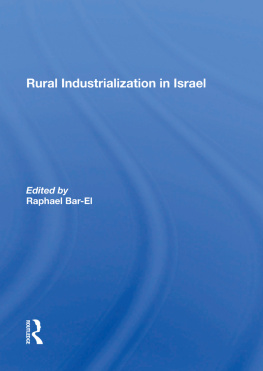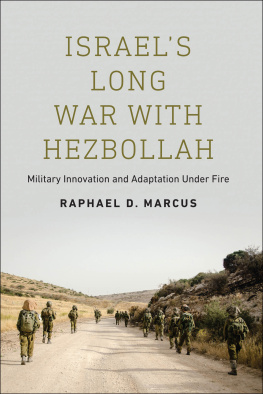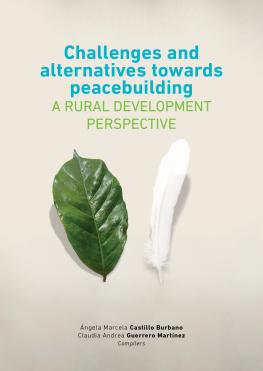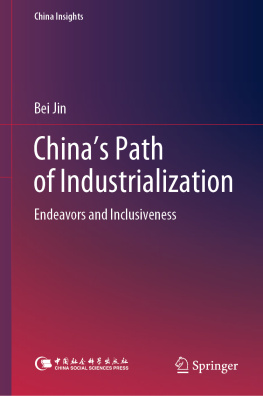RURAL INDUSTRIALIZATION IN ISRAEL
About the Book and Editor
Rural development in Israel consists of a unique variety of industrialization experiences that may be instructive for many countries at various stages of development. The social, ideological, political, economic, and organizational precepts that Israel's rural settlements are based on lend themselves to many different approaches.
This book deals with industrialization patterns in the kibbutz, the moshav, the non-agricultural village, and the Arab village. Prevailing conditions (size and labor force, availability of skills, infrastructure) and objectives (creation of employment, improvement of living standards) vary depending on the specific type of settlement As a result, optimal policy for rural industrialization is different from village to village.
The authors give the general background of and define the specific development objectives for each type of village. They review relevant conditions at the local and regional levels; analyze the individual experiences of industrial development; evaluate economic achievement and attainment of development goals; and determine influential factors. The final aim is to reassess Israeli policies and strategies and offer lessons to other countries undertaking rural industrialization.
Raphael Bar-El is an economist and senior researcher at the Settlement Study Centre. He teaches at Ben-Gurion University.
PUBLISHED IN COOPERATION WITH THE SETTLEMENT STUDY CENTRE (SSC)
Rural Industrialization in Israel
edited by
Raphael Bar-El
with the assistance of Ariela Nesher
First published 1987 by Westview Press
Published 2019 by Routledge
52 Vanderbilt Avenue, New York, NY 10017
2 Park Square, Milton Park, Abingdon, Oxon OX14 4RN
Routledge is an imprint of the Taylor & Francis Group, an informa business
Copyright 1987 by Taylor & Francis
All rights reserved. No part of this book may be reprinted or reproduced or utilised in any form or by any electronic, mechanical, or other means, now known or hereafter invented, including photocopying and recording, or in any information storage or retrieval system, without permission in writing from the publishers.
Notice:
Product or corporate names may be trademarks or registered trademarks, and are used only for identification and explanation without intent to infringe.
Library of Congress Cataloging-in-Publication Data
Rural industrialization in Israel.
(Westview special studies in industrial policy
and development)
Includes index.
1. IsraelIndustries, Rural. I. Bar-El, Raphael.
II. Series.
HC415.25.R87 1987 338.095694 87-2073
ISBN 13: 978-0-367-28634-7 (hbk)
IN MEMORY OF MICHAEL SACHER (1917-1986), CHAIRMAN OF THE BOARD OF TRUSTEES OF THE SETTLEMENT STUDY CENTRE, REHOVOT, ISRAEL
Contents
Acknowledgments
I wish to express my thanks to the members of the Steering Committee for guiding the work of the various contributors to this book and for their helpful comments on the first drafts: Prof. Haim Barkai from the Department of Economics at the Hebrew University of Jerusalem, who acted as Chairman of the Steering Committee; Prof. Shlomo Eckstein of the Department of Economics of Bar-Ilan University, Yehuda Dekel and Yaakov Friedman from the Settlement Department of the Jewish Agency.
My thanks also to Daniel Spiegel for his invaluable help in structuring this book and preparing material for the introductory and concluding chapters, to Shirley Smith for her meticulous editing, to Erna Philip for typesetting, and to Ruth Safran for preparing this book for publication. And I thank the Settlement Study Centre and its Board of Directors for sponsoring this study.
Raphael Bar-El
Industrial Decentralization and Rural Industrialization - A Short Review
In many countries, both developed and less developed, the share of agriculture in employment opportunities for the rural labour force has been steadily decreasing owing to the growing inability of agriculture to meet the demand for employment in rural areas. The high level of demand may result from high rates of natural population growth in rural areas, and in some cases - mainly in developed countries - from a new trend of population migration from big cities to rural areas and small towns. It may also be intensified by a national policy of population dispersion designed to ease the congestion in big cities, solve problems of national security etc. On the other hand, the capacity of agriculture to provide employment is curbed by an increase in the level of agricultural technology and the slow growth of the market for agricultural products. In many cases, including Israel, this tendency is further enhanced by limited resources of land and water. In other cases it is often intensified by deficiencies such as low levels of income and insufficient job diversity to satisfy the needs of the younger and better-educated labour force. Rural industrialization has been put forward as a solution for some of the above problems.
In the last two or three decades we have witnessed new trends in industrial decentralization,
The role of rural industrialization has been analysed and directives for its implementation succinctly outlined in the report of an expert group
Israel as a 'Laboratory Field'
The Israeli experience, because of its special conditions, may add a significant contribution to the analysis of the processes of rural industrialization. Israel has undergone transformation from a 'developing' to a 'developed' country within a relatively short time, and - even more important - its history of rural development provides a unique variety of industrialization experience. Several approaches to rural industrialization are practised, with varying degrees of success; they closely correspond to the type of rural settlement in which they are located, and which themselves represent different social, cultural, ideological, political, economic and organizational precepts. Israel can therefore be viewed as a microcosm, encompassing within a single country a variety of situations which might be found dispersed over many countries and regions at various stages of rural industrialization. The experience gained in rural industrialization in Israel includes the following:
The kibbutz is a rural collective community of several hundred people, based on equality and settled on national land. Ownership of all means of production and assets is joint. No hired labour is supposed to be employed; production and consumption of goods and services are done cooperatively by all members. The original objective of industrialization in the kibbutz was to create employment for its members, and especially for older people who could not be usefully employed in agriculture and industry has been able to provide employment for a significant and growing part of this rural population (50 the 60 percent at present).
The moshav is a cooperative rural community of smallholders, settled on national land in equal-sized family farms, and based on self-labour and mutual assistance. Services to producers are cooperative, but production and consumption are on an individual family basis. A typical moshav has a population of about 60 families. One can distinguish between veteran moshavim, which were settled prior to the establishment of the State of Israel in 1948, and moshavim which were settled in the 1950's by new immigrants, most of them with no previous agricultural experience.











